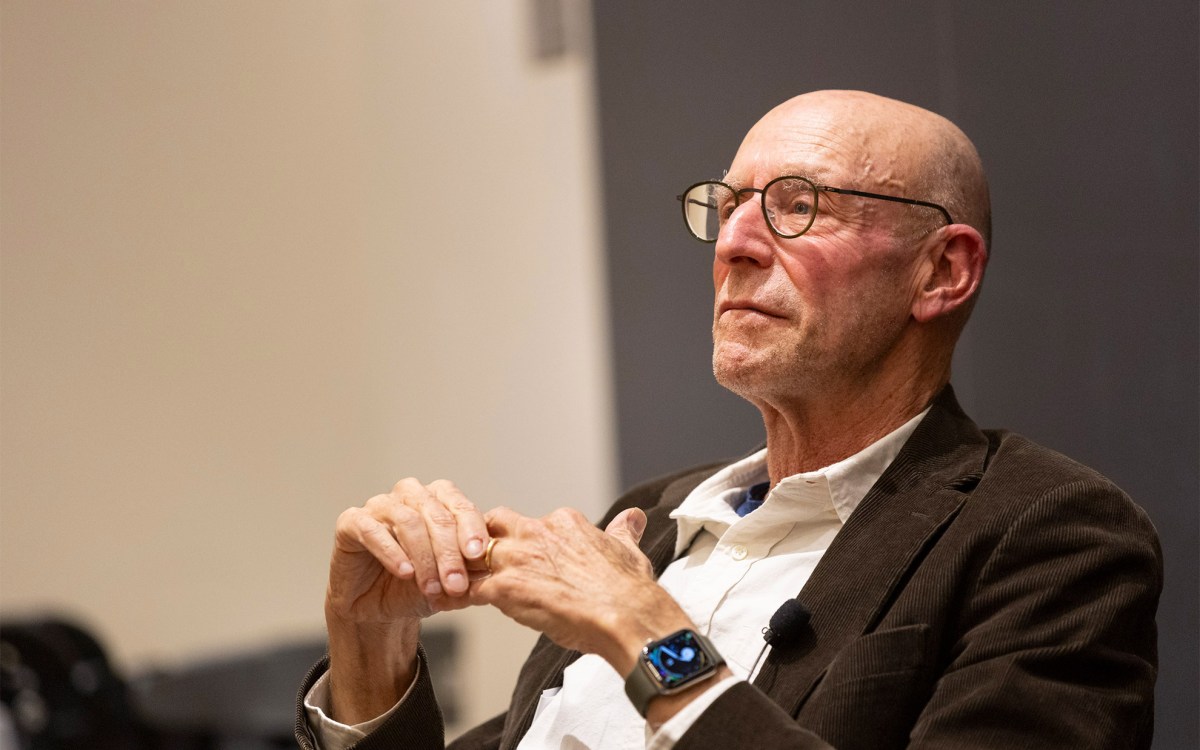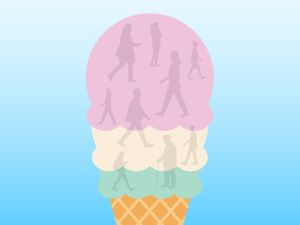Health
-

Yoga can help cut severe, initial opioid-withdrawal period in half, study finds
Researchers say results could dramatically increase chances of recovery
-

6 keys to a long, healthy life (ice cream included)
Also, why reading Ben Franklin beats climbing Mount Everest
-

Six cancers rising faster in younger adults than older ones
Large new global study fuels growing concern over trend of increases in several types

-

What’s next for GLP-1s?
Scientists eye new treatment targets for popular weight-loss drugs, from heart failure to addiction
-

Drinking 2-3 cups of coffee a day tied to lower dementia risk
Caffeinated tea also found to slow cognitive decline in study

-

New AI tool predicts brain age, dementia risk, cancer survival
Unlike other AI models, BrainIAC needs limited data to ID key neurological health indicators

-
Gene scan of Alzheimer’s families identifies four new suspect genes
The first family-based genome-wide association study in Alzheimer’s disease has identified the sites of four novel genes that may significantly influence risk for the most common late-onset form of the…
-
Health disparities in Boston focus of talk at HSPH Community Partnership Day
Boston Mayor Thomas M. Menino and the city’s top health official, Barbara Ferrer, speaking at the Harvard School of Public Health’s (HSPH) 18th Annual Community Partnership Day, said efforts to end racial health disparities must go forward in the city even as the nation’s economy falters.
-
In survey, patients give some high, some low marks to hospitals
The quality of hospitals across the United States is inconsistent. To address this issue, the federal government and private organizations have begun to publicly report data, such as how well hospitals treat certain conditions. But until now, there has been no data on how patients themselves feel about the care they received. A new study by Harvard School of Public Health (HSPH) researchers analyzed the first national data on patients’ experiences in hospital settings and found that though patients are generally satisfied with their care, there is substantial room for improvement in a number of key areas, including pain management and discharge instructions.
-
Status of women in academe assessed
More than three decades of championing better opportunities for women has yielded critical changes, but there is still work to be done.
-
Obama voters much more likely to believe outcome will impact health care
As part of the ongoing poll series “Debating Health: Election 2008,” the Harvard Public Opinion Research Program at the Harvard School of Public Health (HSPH) and Harris Interactive conducted a new survey focused on whether voters believe the results of this presidential election will make “a great deal of difference” in the state of the nation’s health care and other key policy areas. Although much has been made of voter cynicism in recent times, a majority of registered voters believe the outcome of this election will make a great deal of difference on key issues including the war in Iraq (63 percent), the economy (52 percent), the war in Afghanistan (50 percent), and national security (50 percent). This survey was conducted Oct. 16-19 by telephone among a national cross section of 957 registered voters in the United States.
-
Researchers gain ground in treatment options for disfiguring tumor
A team of researchers led by Harvard School of Dental Medicine (HSDM) Dean for Research Bjorn Olsen has discovered a mechanism for the rapid growth seen in infantile hemangioma, the most common childhood tumor.
-
New Guinea forest expands ‘observatory’
Just getting there takes hours of hot, sweaty hiking through lowland Papua New Guinea forests: three hours from the road to the base camp, then another seven to the site. That’s when the real work begins: tagging, measuring, and identifying 250,000 trees scattered over 50 hectares.
-
Gene therapy restores vision to mice with retinal degeneration
Massachusetts General Hospital (MGH) researchers have used gene therapy to restore useful vision to mice with degeneration of the light-sensing retinal rods and cones, a common cause of human blindness. Their report, appearing in the Oct. 14 Proceedings of the National Academy of Sciences, describes the effects of broadly expressing a light-sensitive protein in other neuronal cells found throughout the retina.
-
Global ‘chump change’ could provide biodiversity protection
Harvard biologist Edward O. Wilson said the Earth’s major biological hot spots could be conserved for roughly $50 billion— an amount he termed “chump change” in a world of trillion-dollar financial bailouts.
-
‘Death protein’ may lead to drugs that force cancer cells to self-destruct
Scientists at Dana-Farber Cancer Institute have identified a previously undetected trigger point on a naturally occurring “death protein” that helps the body get rid of unwanted or diseased cells. They say it may be possible to exploit the newly found trigger as a target for designer drugs that would treat cancer by forcing malignant cells to commit suicide.
-
Genome Project releases data on 10 genetic pioneers
The world moved a step deeper into the DNA age Monday (Oct. 20) as 10 volunteers released their genetic and medical information on the Internet as part of a multiyear effort to make genetic data an everyday part of medical care.
-
Researchers identify promising gene target for neuroblastoma therapy
Researchers at Dana-Farber Cancer Institute have identified a set of previously unknown mutations in a single gene in 8 percent of neuroblastomas, tumors of the nervous system that occur in young children and account for approximately 15 percent of all childhood cancer deaths.
-
NYU chemist Robert Shapiro decries RNA-first possibility
Back in the depths of time, an event almost miraculously improbable happened, creating a long, unlikely molecule. And life arose on Earth. Or, if you prefer, back in the depths of time, in a soup of small, relatively common molecules, an unknown chemical reaction occurred, sustained itself, replicated … and life arose on Earth.
-
Cooper: Doctor-patient relations cause health disparities
In the United States, a black man can expect to die, on average, 10 years earlier than his white counterpart. For black women, that racial gap in life expectancy is five years.
-
Scientists unlock secret of death protein’s activation
Harvard Medical School researchers at Dana-Farber Cancer Institute have identified a previously undetected trigger point on a naturally occurring “death protein” that helps the body get rid of unwanted or…
-
Volunteers unveil DNA, medical data in push for everyday gene sequencing
The world moved a step deeper into the DNA age yesterday as 10 volunteers released their genetic and medical information on the Internet as part of a multi-year effort to…
-
Reading human history in the bones of animals
In a Siberian cave Patrick Wrinn found bones: bones of sheep and goats, bones of extinct bison and horses, of mammoths and wooly rhinoceroses. Wrinn, a doctoral student in archaeology at the University of Arizona and member of the Harvard Class of 1998, is trying to find out who — or what — put the bones there.
-
Major step forward in cell reprogramming
Imagine, if you can, a day within the next decade when a physician-scientist could remove a skin cell from your arm and with a few chemicals turn that fully formed adult cell into a dish of stem cells genetically matched to you.
-
Study shows what smokers need to stay clean
Hospital-sponsored stop-smoking programs for inpatients that include follow-up counseling for longer than one month significantly improve patients’ ability to stay smoke-free. An analysis of clinical trials of programs offered at hospitals around the world finds that efforts featuring long-term support can increase participants’ chances of success by 65 percent.
-
Genetic ‘fingerprint’ shown to predict liver cancer’s return
Scientists have reached a critical milestone in the study of liver cancer that lays the groundwork for predicting the illness’s path, whether toward cure or recurrence. By analyzing the tissue in and around liver tumors, an international research team has identified a kind of genetic “fingerprint” that can help predict whether cancers will return.
-
Scholar: Health facts about U.S. Latino communities belie stereotypes
Decades after predicting Latinos will become California’s majority, a leading researcher into Latino health argued Wednesday (Oct. 8) that the development might mean a healthier population.
-
Study examines association between caffeine, breast cancer risk
Caffeine consumption does not appear to be associated with overall breast cancer risk, according to a report in the Oct. 13 issue of Archives of Internal Medicine, one of the JAMA/Archives journals. However, there is a possibility of increased risk for women with benign breast disease or for tumors that are hormone-receptor negative or larger than 2 centimeters.
-
Caffeine not associated with overall breast cancer risk;
Ken Ishitani of Brigham and Women’s Hospital and Harvard Medical School, and Tokyo Women’s Medical University, Japan, and colleagues report in the Oct. 13 issue of Archives of Internal Medicine…
-
Another step forward in cell reprogramming
Imagine, if you can, a day within the next decade when a physician-scientist could remove a skin cell from your arm, and with a few chemicals turn that fully formed adult cell into a dish of stem cells genetically matched to you.
-
Hansjörg Wyss gives $125M to create institute
Engineer, entrepreneur, and philanthropist Hansjörg Wyss, M.B.A. ’65 has given Harvard University $125 million to create the Hansjörg Wyss Institute for Biologically Inspired Engineering.
-
Financial risk-taking behavior is associated with higher testosterone
Higher levels of testosterone are correlated with financial risk-taking behavior, according to a new study in which men’s testosterone levels were assessed before participation in an investment game. The findings help to shed light on the evolutionary function and biological origins of risk taking.
-
Advance in pluripotent cell creation
A team of Harvard Stem Cell Institute (HSCI) scientists has taken an important step toward producing induced pluripotent stem (iPS) cells that are safe to transplant into patients to treat diseases. Excitement over the ability of researchers to create this form of stem cell by inserting four genes into adult cells has thus far been tempered by the fact that the genes have been inserted using retroviruses, which have the potential to “turn on” cancer genes and trigger tumor growth.
-
New approach to gene therapy may shrink brain tumors, prevent their spread
Massachusetts General Hospital (MGH) researchers are investigating a new approach to gene therapy for brain tumors — delivering a cancer-fighting gene to normal brain tissue around the tumor to keep it from spreading. An animal study described in the journal Molecular Therapy, the first study to test the feasibility of such an approach, found that inducing mouse brain cells to secrete human interferon-beta, a protein, suppressed and eliminated growth of human glioblastoma cells implanted nearby.
-
The pine beetle’s tale
Researchers at Harvard Medical School and the University of Wisconsin, Madison, have discovered how beetles and bacteria form a symbiotic and mutualistic relationship — one that ultimately results in the…
-
Incoming School of Public Health Dean Julio Frenk Receives Clinton Global Citizen Award
Julio Frenk, who will become Dean of Harvard School of Public Health in January, 2009, has received a Clinton Global Citizen Award. In naming Frenk, along with four other individuals,…


